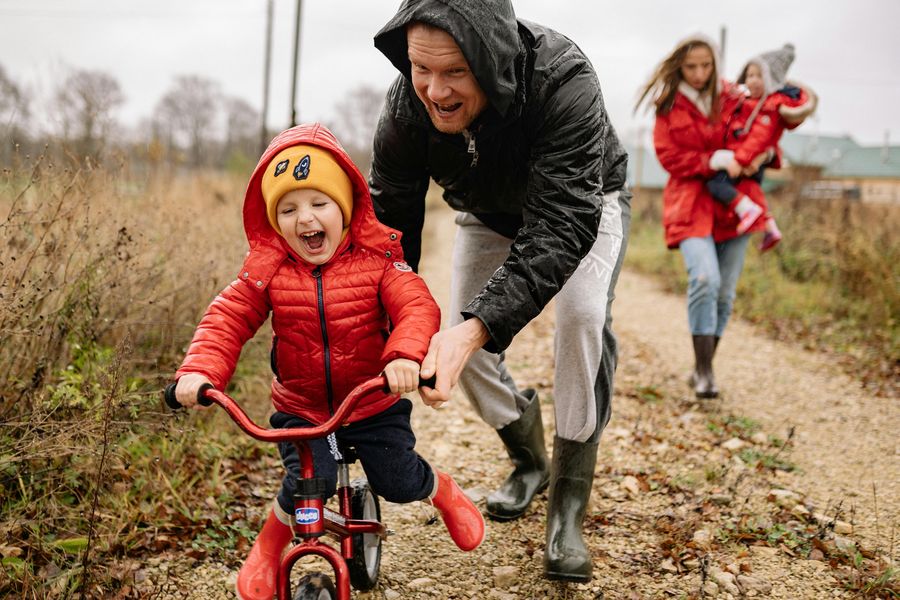Effective Parenting Tips: Helping Your Child Grow and Flourish
Parenthood is an ever-evolving journey that requires constant learning and refinement of good habits. You might feel stressed and anxious doing what is best for your child as you navigate the learning phase together.
However, it is important to observe and imitate good parenting practices to mold your child into a confident and responsible individual. Here are some effective parenting tips to help you hone your parenting skills.
Scrutinizing your moves
Your child learns from the way you conduct yourself on a day-to-day basis. Therefore, it is essential to adopt good habits and behaviors worthy of emulation.
Children are like sponges; they soak up the information around them like a sponge. Therefore, it is crucial to maintain good habits and behaviors, particularly in their early years.
Supporting, not enforcing
As parents, we have our ideologies that we want our children to embody. However, it is important to allow our children to make their own decisions and choices.
Innovative and progressive parenting differs from traditional parenting, which involves enforcing what you know to be right on your children. Instead, it is necessary to support and encourage your children to find their unique path in life.
Establishing communication
Many parents face the challenge of bridging the communication gap with their children, especially in the teenage years. It is essential to establish an open communication channel to ensure that your child can express themselves freely.
Learning your child’s language of communication and emotions helps to strengthen your bond and create a healthy relationship that can withstand any obstacle.
Showing love through actions
It is essential to express love, care, and concern through gestures and bonding activities. Our children need to feel our love and affection to help them grow into confident and secure individuals.
Simple acts like listening, touch, and spending quality time with them can reinforce our love and affection for our offspring.
Being involved in their lives
Our involvement in our child’s life should extend beyond infancy. Showing interest in their activities, academics, and life in general can help us build a strong bond with them.
It also helps to create a sense of accountability, as your child knows that you will critique their actions with love and satisfaction.
Making your own path
It is crucial to understand that our parenting style will evolve as we learn more about our children. We all have our unique approach to parenting, and in many cases, we may face harsh criticism from others.
However, it is necessary to find what works best for us and our children. So, embrace who you are as a parent and make space to help evolve your parenting style.
Predefining house rules
It is necessary to predetermine the ground rules to help manage your child’s expectations and limit breaking rules. When your children know what is expected of them, it helps create a sense of discipline, responsibility and comfort zone for them.
Controlling your first reaction
Only a miniature proportion of our decision-making is rational; most of our decisions are driven by emotions. As a parent, it is essential to control your first reaction when addressing challenging situations with your child.
A negative impact on one situation may be born out of stress and anxiety, costing a positive habit. Therefore, it is important to not only control your emotions but also ensure a positive impact on your child.
Maintaining your parenting goal
Every parent has a reason for their actions
So, be clear on your parenting goals and make any necessary changes to align your actions. Challenges of Parenting: Navigating Through Challenging Times The unpredictability of parenthood is one of the most challenging aspects of parenting. Each situation requires a unique answer, and what worked before may not work again. Understanding and refining your mindset to handle the current situation can help reduce stress and anxiety surrounding our children’s growth and development. Below are some general challenges and how to cope with them. As our children grow, we need to adapt and evolve our parenting methods to effectively meet their needs. Reliving your childhood can help to bridge the age difference and understand the challenges they face. This enables us to understand our child’s perspective and respond appropriately to their needs. Mistakes and failures are a natural part of the growth process, and rather than punish your child, encourage a growth mindset and embrace experimentation. Encouraging learning from failure builds resilience and critical thinking skills that are essential in adult life. As a working parent, time management is essential. It can be challenging to balance work and parenting effectively. Creating a routine helps to reduce stress and ensure everything is taken care of, giving you time to focus on your children. Talk to your employer; they may be supportive in creating a flexible working arrangement, such as working from home or flexible working hours. Tantrums, aggression, and poor mental health are some of the toughest challenges any parent can face. However, these situations can be addressed through effective communication. Rather than becoming aggressive, develop plans that create a safe and secure environment for you and your child. Speak with your healthcare provider or mental health counsellor if mental health issues seem to persist. In conclusion, parenting is an ever-evolving journey that requires constant learning and refinement. Our children look up to us as a standard for a good life; thus, we must establish good habits, maintain open communication, and be involved in their lives. We should also personalize our parenting approaches that are consistent with our parenting goals, handle any growing and evolving challenges, such as balancing work with effective and focused parenting, and make adjustments with an evolving approach that helps our child grow and flourish. Parenting Skills: Approaches for Nurturing Positive Behaviors Parenting is an art that requires us to hone our skills to ensure we effectively guide our children towards becoming responsible adults. Positive reinforcement, setting boundaries, active listening, conflict resolution, and emotional intelligence are essential parenting skills to master. Let’s explore these skills in detail. Children respond well to praise and rewards. Positive reinforcement is critical in helping children develop positive behaviors. When children exhibit positive behaviors, parents can offer praise and rewards to motivate them to continue. Rewards could include a favorite toy, an experience, or a treat. Positive reinforcement strengthens the bond between parent and child and creates a positive environment of mutual respect and trust. Children test boundaries to understand limits and its consequences. Setting boundaries can be a firm yet respectful way of discipline. It also helps our children understand and respect social norms. It is essential to establish the limits with clear consequences in mind. This way, you can be consistent in enforcing them, and the child will have a clear understanding of what to expect when they break the rules. Creating an environment of respect and discipline is crucial for effective communication and social learning. Listening is a crucial communication skill in parenting. It’s not just hearing what the child has to say, but also understanding their perspective. Active listening entails attentiveness, validation, empathy, and trust. When parents listen actively, they can learn about their child’s emotional state, thoughts, and feelings, and it reinforces the bond between the parent and child. Listening actively helps to nurture a child’s emotional well-being, which is critical to their success in society. Living in a social environment means we will face conflicts from time to time. It is necessary to teach our children conflict resolution as an essential skill. Conflicts can be resolved through effective negotiation, compromise, problem-solving, and mediation. Teaching our children to be proactive, think outside the box, and be open-minded gives them tools for resolving conflicts. Conflict resolution helps to build essential life skills and promotes character building. Emotional intelligence is the ability to identify and manage emotions. Emotional intelligence includes self-regulation, empathy, social skills, and self-awareness. Emotionally intelligent children have better communication, improved self-esteem, and healthy relationships. To cultivate emotional intelligence, parents must understand and regulate their own emotions. This way, they can create an environment that models emotional intelligence rather than just explain it. Parenting Styles: Which One Suits your Parenting Goals? Parenting styles refer to the unique approaches we apply when raising and nurturing our children. Four distinct parenting styles are employed: authoritarian, permissive, uninvolved, and democratic. Understanding the parenting styles can help you find a style that suits your parenting goals and ensures you raise confident, responsible, and happy children. Authoritarian parenting is based on strict rules and harsh punishments. Authoritative parents require children to follow rules regardless of their agreement and instead seek and demand obedience. Authoritarian parenting is centered on traditional perspectives of parenting. Permissive parents are lenient and provide minimal guidance to their children. It is a hands-off approach that allows children to make their decisions and pursue their interests without interference. Permissive parents aim to provide complete freedom to the child, who may not yet have the maturity to handle the freedom and may fail to build critical life skills. Uninvolved parents are mostly absent, neglectful, or unresponsive, and this often leads to children who feel unsupported and insecure. These parents are typically withdrawn and view parenting as an individualized activity that takes away from their goals. Democratic parenting is a collaborative approach that seeks to create a balance between discipline and freedom. Democratic parenting is centered on respect, fairness, and flexibility and tends to build the foundation for social competence. Democratic parenting is considered the most effective parenting style as it teaches children how to resolve conflicts, take responsibility, and exercise self-control. In conclusion, there’s no perfect approach to parenting. Effective parenting requires a blend of supportive and challenging environments that enhance a child’s growth and development. Employing positive reinforcement, setting boundaries, active listening, conflict resolution skills and emotional intelligence helps to enhance parenting skills. Understanding the different parenting styles helps you to find a style that suits your parenting goals and creates an enabling environment for the well-being and growth of your child. Parenting for Different Stages: Nurturing Your Child’s Development Children experience different stages of development that require different approaches to parenting. Infancy, toddlerhood, childhood, and adolescence mark the stages of child development, each with unique milestones. In this article, we explore the different stages of child development and strategies for effective parenting. Bonding and attachment form the basis of parenting in infancy. Creating a strong bond with your infant helps create a sense of security, trust, and confidence. Consistent routine, feeding, and sleep are essential for the baby’s development and well-being. Effective communication through eye contact, touch, and facial expressions also promotes social and emotional development and attachment. Toddlerhood is the stage where children become more independent and are eager to explore their world. Language development is a critical milestone at this stage, so routine storytime, talking, and singing are essential activities for development. Potty training, behavior management, and setting clear rules and boundaries are necessary to guide their explorations in a safe and responsible way. Childhood sees learning and education at the forefront. It’s important to encourage children to explore their interests, socialization skills, values, and foster their independence. Education should go beyond academic studies and should also include creative expression, critical thinking, and problem-solving. Encouragement for children’s decision-making helps them become responsible decision-makers in the future. Adolescence marks the period of identity formation. Puberty, peer pressure, risk-taking, and emerging independence make this stage challenging. Adapting to new communication strategies that allow the child to voice their opinion freely, good parenting values and a supportive environment are required. Healthy boundaries and setting reasonable expectations help adolescents navigate the complex and difficult transition and build resilience. Effective parenting plays a significant role in children’s cognitive, emotional, social, and physical development. Here are some ways parenting is essential for life-changing impact. Parenting supports childrens intellectual development, learning, and problem-solving skills. When parents engage children in new experiences, exploration, and learning opportunities, it promotes cognitive development. Encourage children to question, express, and engage in creative thinking to develop their thinking and reasoning skills. Developing a sense of self-esteem, resilience, empathy, and coping skills is critical in nurturing emotional development. Parents must create a safe and secure environment that provides comfort and support to the child who feels secure and has a sense of control over their environment. Encouraging children to identify their emotions and work through them helps them develop healthy coping mechanisms. Creating opportunities for children to practice communication, build relationships, functioning as a team member, and leadership helps develop social skills. Parents should teach appropriate behavior, train them on how to relate to different people, and teach them the value of mutual respect. Parenting is also important for physical development. Teaching children about health, nutrition, exercise, and sleep hygiene is essential in creating a healthy lifestyle. Additionally, preventing them from engaging in risky behavior, promoting healthy hobbies, and having active family time is a healthy way to implement positive lifestyle choices. In conclusion, effective parenting involves nurturing and guiding children through their unique stages of development. Effective parenting involves observing their developmental milestones, setting age-appropriate goals, supporting and providing opportunities to foster their cognitive, emotional, social, and physical development. Ultimately, good parenting promotes healthy development, fosters resilience, instills good values, promotes independence, and strengthens the bond between parent and child that will last a lifetime. In conclusion, effective parenting requires a diversity of skills and techniques that cater to the various stages of child development whereby parents may have to adjust their parenting styles to suit their child’s needs. Encouraging a positive mindset, being attuned to children’s developmental milestones, adopting good communication, setting routine limits and understanding cognitive, emotional, social, and physical development are some of the key approaches effective parenting requires. Being an effective parent is essential in shaping a child’s growth, development, and adulthood. While there is no fixed or perfect approach to parenting, these fundamental skills and approaches enable parents to create a nurturing environment that fosters the best outcomes for their children. Hence, approaching parenting positively, being hands-on, and constantly learning through each stage of a child’s growth are the keys to raising a happy, confident and well-rounded child.Evolving with your kids
Learning from failure
Balancing work and parenting
Handling difficult situations
Positive Reinforcement
Setting boundaries
Active Listening
Conflict Resolution
Emotional Intelligence
Authoritarian
Permissive
Uninvolved
Democratic
Infancy
Toddlerhood
Childhood
Adolescence
Importance of Parenting: Impact on Development
Cognitive Development
Emotional Development
Social Development
Physical Development



